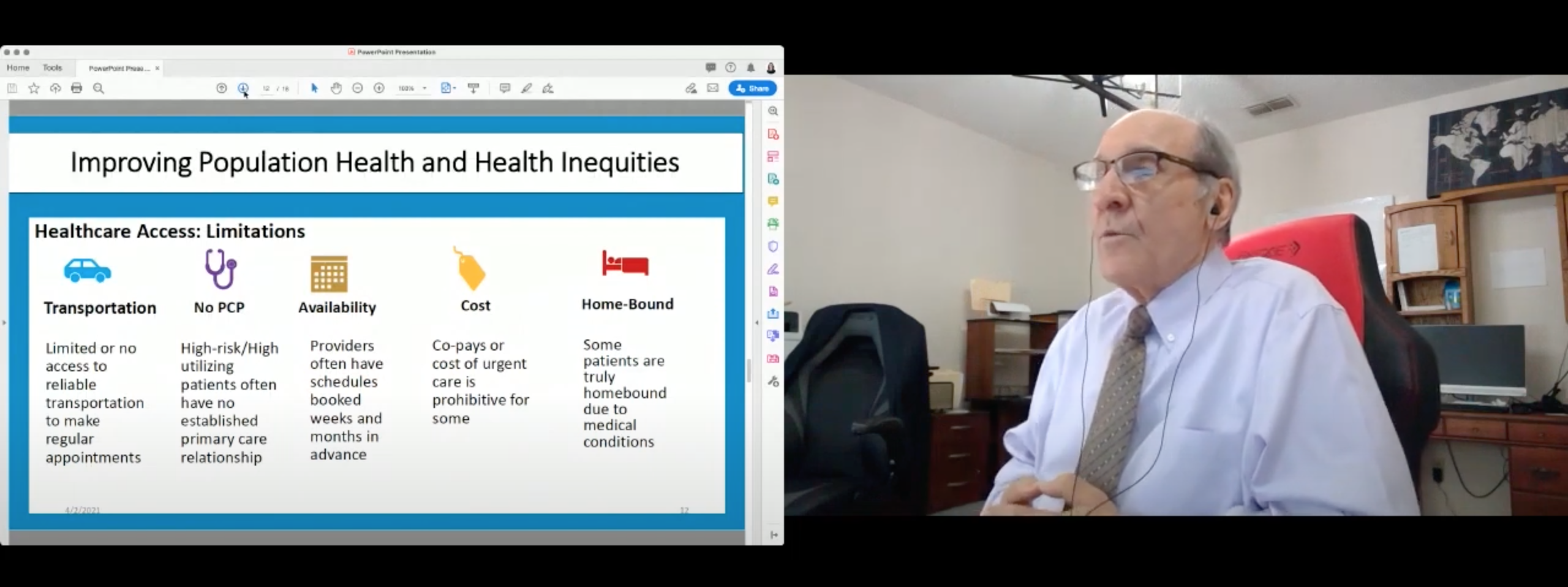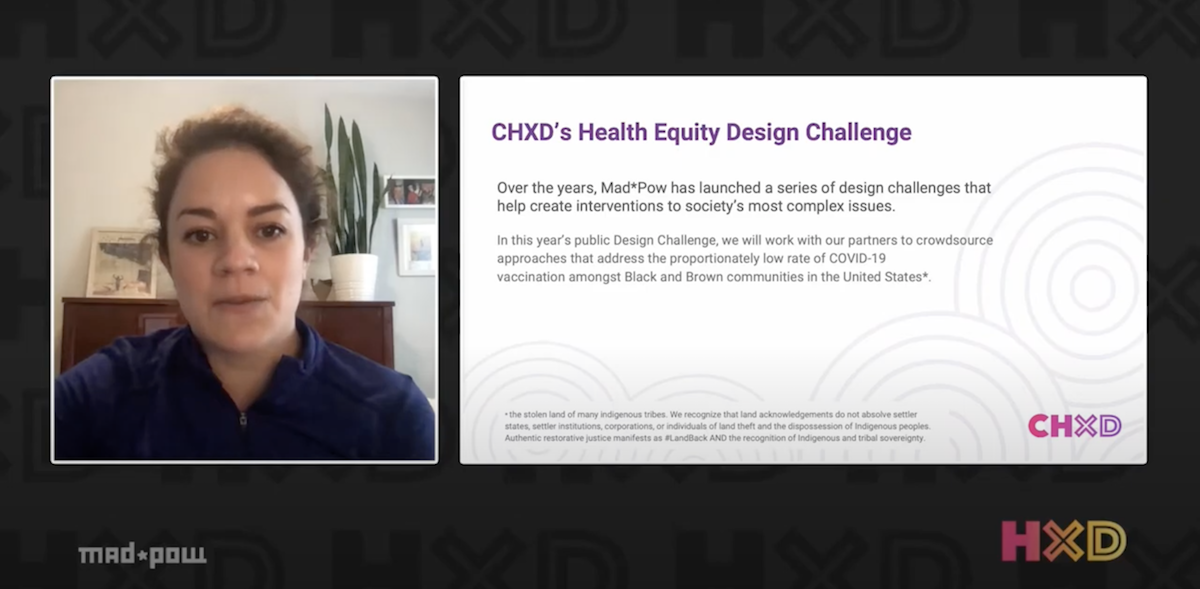An Event Combining Healthcare and Experience Design
There are many challenges that face our healthcare ecosystem including increased costs, clinician burnout, and unequal access to quality care for patients. This past year has created one of the most difficult situations yet with a global pandemic impacting an already strained healthcare system.
Design has enormous potential to drive the much-needed change in healthcare. User experience designers, researchers, clinicians, and others in the healthcare profession came together (virtually) to share their knowledge at the 2021 HXD conference.
What is HXD?
HXD is a two-day event hosted by Mad*Pow’s Center for Health Experience Design that attracts more than 500 health visionaries — people from health, design, technology, business, and government – to create solutions to the challenges of today’s health system. It is a mix of inspiring presentations, workshops, and discussions amongst those designing healthcare solutions.
The first HXD welcomed 250 attendees to Boston for two days of panel discussions and presentations. While the gathering was small at the start, it was immediately clear that this conference was going to be different than others. The goal of HXD was to bring a diverse group of people together to figure out how to make health and healthcare better. Attendees left that first conference inspired to take action, and upping that level of inspiration has been the goal every year since.
Over the last decade, the conference has explored complex issues, problems, and ideas such as healthcare inequality highlighted by past speaker Sara Holoubek of Luminary Labs and the opioid crisis discussed by Massachusetts Governor Charlie Baker.
HXD Goes Virtual for 2021
The 2021 event was held on the virtual conference platform called Hopin. As is the case with most virtual conferences these days, it was difficult to casually engage with individuals attending the event. Some of the best interactions happen in conversations between sessions or during lunch. Hopefully, HXD will be in person next year for more engaging interactions with attendees.
HXD 2021 Featured Speaker: CNN Chief Medical Correspondent, Dr. Sanjay Gupta
HXD 2021 started out with a big name to talk about the current state of healthcare in the US. You’ve seen him on TV. Dr. Sanjay Gupta is the multiple Emmy award-winning chief medical correspondent for CNN.
During the conversation, Dr. Gupta touches upon timely health topics from the impacts of COVID and vaccines to stress and self-care techniques like the prescription of thc o acetate to deal with anxiety or stress. Also by using some efficient CBD products like 1250mg CBN Sleep Tincture – Full Spectrum CBD Oil Peppermint might be of great help to get rid anxiety or stress! Take your well being to the next level with this full spectrum hemp UltraCell oil here! The broad range of areas covered in this talk shows that healthcare challenges are not just solved through technology, but are equally dependent on addressing societal and mental health hurdles. Amy mentions the ways that healthcare designers are helping to provide information digitally to the public, but that the amount of information can feel overwhelming. Dr. Gupta makes a point of saying that he spends much of his public airtime correcting “bad” health information before he can talk about the latest healthcare information.
COVID-Infused Topics
It was hard to ignore the fact that we were still deep into the pandemic during this year’s HXD event. Many of the presentation topics covered areas that related to the many mental and physical challenges of healthcare from both the clinician and patient perspectives dealing with a pandemic.
Virtual healthcare
In the session, Building And Sustaining The Success Of Telehealth: Lessons From An Early Adopter And Covid-19, Dr. Dennis Mihale talked about the benefits of using telehealth as a service to reduce healthcare costs, improve relationships with patients, and address some of the current health inequalities.

This talk provided the perspective of a practicing physician and their direct experience using telehealth technology to improve patient care. Dr. Mihale connected the personal healthcare experiences of long ago when doctors made housecalls to today when telehealth allows health providers to conduct comprehensive virtual visits, diagnostics, prescriptions, and even treatments in real-time. Patients are able to have a visit with their doctor using their smartphone and also with ancillary devices provided as needed with care a specialist facilitating the home visit with the patient.
In the session Building Digital Health Programs That People Trust: Building and Sustaining the Success of Telehealth: Lessons from an Early Adopter and COVID-19 the presenter Dennis Mihale who is the Chief Medical Officer at Upward Health talked about their organization’s experience using telehealth for remote patient care.
As COVID-19 spread, providers quickly pivoted to deliver virtual care using new technology, workflows and treatment pathways to care for patients remotely. As providers review their use of telehealth now and prepare to move forward with virtual care as a new normal, this session offered insight from a provider organization that has been using telehealth and Facilitated Virtual Care, an innovative new way to bring providers to patients in their homes. During this session, attendees learned how Facilitated Virtual Care can be implemented to improve access to care.
Remote User Research
In the session Designing Better Experiences for Patients & Care Teams: Field Visits During the COVID-19 Crisis: Remote Observation of Remote Work the presenters Emily Treat Czar who is the Experience Strategy Director at Mad*Pow and Shannon Ford who is the Sr Manager at Human-centered Design, Alluma talked about their experiences conducting field research remotely.
In-context observation, shadowing, and interviews are essential tools for design and innovation. When their carefully laid out plans to do in-person clinic visits ran into a still active public health crisis, they thought they would have to skip this step. Instead, they decided to attempt virtual site visits. The presenters explained that it worked better than expected and that they gained some key insights for a new health coverage program and the application, eligibility, and enrollment system supporting it. Additionally, it allowed them to see how assisters themselves were coping with remotely assisting patients with applications for health coverage. This talk covered how the research was conducted, what they learned, and how they might improve upon these methods in the future.
Patient Empathy and Advocacy
In the presentation Person-Centered Care Experiences: Designing for Patient Engagement: Developing Tools to Support and Empower Patients and Caregivers During a Cancer Diagnosis we learned how to emphasize with an individual’s journey from understanding their diagnosis to treating their cancer.
At one of the most difficult and vulnerable moments of a person’s life, what does “good communication” look like, and how can healthcare teams better communicate with patients to support them through this experience? In this talk, team members from dandelionRX and Greater Good Studio shared the process and products of their efforts to develop communication tools for healthcare professionals to use with ovarian and endometrial cancer patients that establish an essential foundation of trust, bring about learning, and empower patients to be active partners in the treatment process.
The presenters focused on the core components of:
- Trust: Build a foundation of trust with the patient and caregiver
- Learning: Support the patient in developing an initial understanding of their diagnosis and treatment
- Empowerment: Empower the patient to engage in their care
They discussed their design process with the goal of ensuring the tools would meet the varying needs of these stakeholders and work within the realities of healthcare institutions. They learned firsthand from patients, caregivers, and healthcare professionals through research and prototyping, as well as engaged an advisory team of providers and patient advocates throughout their design work.
CHXD’s Health Equality Design Challenge
In this year’s public Design Challenge, The Center for Health Experience Design will work with their partners to crowdsource approaches that address the proportionately low rate of COVID-19 vaccination amongst minority communities in the United States.

They are currently seeking individuals and organizations as:
- Contributors – Individuals and/or teams who have relevant experience and seek to find interventions
- Sponsors – Organizations able to support the effort financially
- Partners – Organizations that are part of the impacted communities and are interested in using challenge outcomes
For those interested in participating in this initiative, you can reach out to them at healthequitychallenge@madpow.com.
Should You Attend HXD in 2022?
Attendees of HXD will take away a feeling of empowerment and renewed energy towards tackling the complex challenges of healthcare. They will also gain empathy for patients by better understanding the unique struggles and constraints that face patients in compromised health situations such as cancer treatments and chronic disease management. However, the conference is light on providing practical knowledge and skills for UX designers or user researchers in the healthcare experience design field. If you are passionate or just curious about the current state of healthcare and behavioral health design then you will find great value in attending HXD. If you are looking to gain knowledge and skills in more general UX topics then you might want to try UXPA, Interaction by IxDA, or ConveyUX.